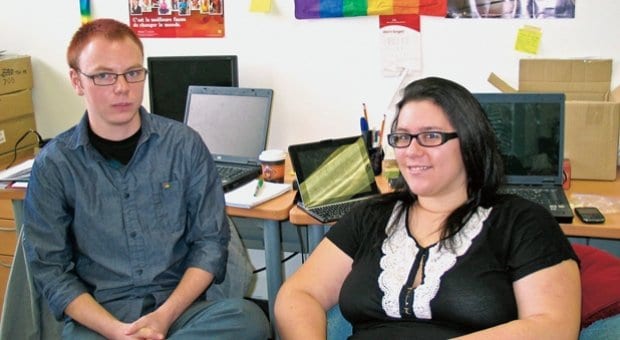When Gabrielle Castilloux was a student at a Catholic high school, it wasn’t unusual to see straight students openly making out, she says, but it was made clear queer students had better not be seen holding hands.
The glaring double standard was alienating to Castilloux, a two-spirit, queer Mi’kmaq student who’d moved around a lot as a kid, living “everywhere in Quebec.” Once she settled in the Ottawa-Gatineau area and switched to a non-Catholic high school, Castilloux’s activism knew no bounds. She became president of her high school’s gay-straight alliance (GSA), organized her school’s Day of Pink, took part in a GSA conference with Jer’s Vision and did advocacy work for trans rights.
Now a fourth-year social work student at Carleton University, Castilloux is thrilled to be working with PFLAG Canada. She and Shayne Ivany are PFLAG Canada coordinators, working part-time out of the downtown Ottawa office the organization shares with Jer’s Vision.
Formerly located in Moncton, PFLAG Canada’s national office recently moved to Ottawa, where it’s being run under the interim directorship of Jeremy Dias, founder and executive director of Jer’s Vision, an organization working to eliminate bullying and discrimination in schools.
“I think it’s a great partnership,” Ivany says. “I think Jer’s Vision is very involved in schools and workshops, and PFLAG Canada is very inclusive and they can help when it comes to supporting on the national level. They’re working together to grow more, and I think it’s going to help right across the country.”
Passionate about their work, Ivany and Castilloux get along well together, sitting side by side as they answer phone calls and emails, connecting with PFLAG volunteers from across the country. They take calls from teachers who want pamphlets and posters, from chapters looking for fundraising ideas and from people interested in starting chapters in their communities.
They also get calls and emails from adults and youth who are upset because they’ve recently come out as queer or trans and are struggling to find support. Other calls and emails are from people whose friend or family member has recently come out and they want to be supportive but don’t know what to say.
“I think PFLAG Canada, we try to give people resources so that they have the words,” Ivany says. “For me, coming out as a trans youth, we didn’t have the words and we didn’t know where to go for help. I think PFLAG is working on that so we can give people the opportunity to have the words and that they can have support.”
Originally from a small religious community in Newfoundland, Ivany attended a Jer’s Vision conference in the summer and since moved to Ottawa and became a PFLAG coordinator. He’s now working to help isolated communities — including his hometown — start their own chapters.
“It’s very hard for them to get off the ground,” he says. “In rural communities especially, there isn’t help right now in a lot of places. Our biggest barrier is changing the minds and educating people in those communities so we can go in and help. When it comes to bigger cities, there are still a lot of problems, but not as big as it would be in a rural community.”
Starting up a PFLAG chapter is no small feat. As a chapter leader you have to put in about 12 to 20 hours of volunteer work a month doing everything from networking and organizing to facilitating discussions and taking care of crisis situations when someone calls in distress, Castilloux says.
When a full-fledged chapter isn’t feasible, either because there aren’t enough interested people in the community or no one’s available to be the chapter leader, you can instead become a PFLAG contact, she says.
“We have contacts right now, quite a few of them, all across the country,” Castilloux says. “Usually, contacts are people who recognize that there needs to be some kind of support for queer and trans people in their community; however, they themselves can’t take on the task of being a chapter leader.”
Whenever possible, contacts help people to connect with nearby support services. When none are available, some contacts buy second cellphones to provide crisis lines for their communities.
“I know one contact in Saskatchewan actually deals with about seven different rural cities that have her cellphone as an emergency crisis contact,” Castilloux says.
Currently, she and Ivany are trying to plan a PFLAG conference at the Gender and Sexuality Minorities Summit in Toronto in June.
“It’s a really, really great time to have all the PFLAG chapters come together and receive training, as well as to network,” Castilloux says. “We have chapters from Sydney, Nova Scotia, to Victoria, BC, and they’ll never really get a chance to meet if it isn’t for something like this.”
With Jer’s Vision’s strong record on conferences and workshops and PFLAG’s national prominence, the two organizations will continue to grow and build healthier communities by promoting anti-homophobia, anti-transphobia and support for youth and adults alike, Ivany says.


 Why you can trust Xtra
Why you can trust Xtra


